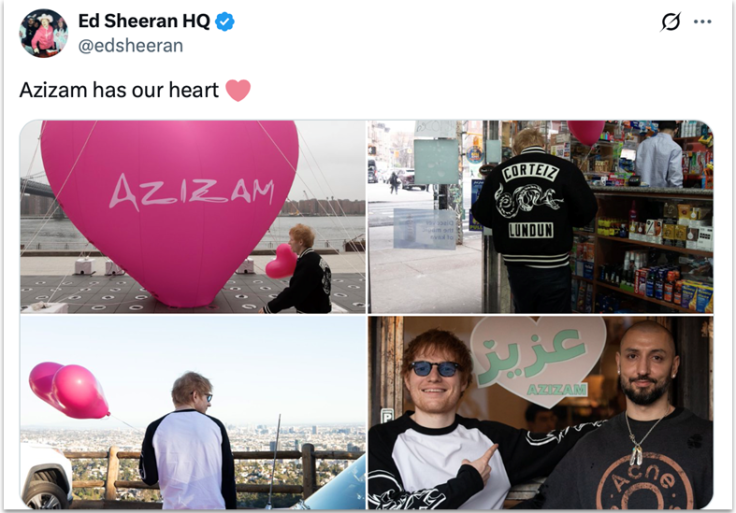From Punk Riots to Persian Ballads: British Artists Tearing Up the Rulebook in 2025
From Glastonbury anthems to unexpected diasporic ballads, British artists are using music to navigate politics, language, and belonging

If there's one thing Brits love more than queuing and complaining about the weather, it's music. In Britain, music has never just been something we listen to — it's something we believe in, debate about, or belong to. Whether on a festival stage or through headphones on the Tube, music remains one of the most potent tools for exploring identity, community, or simply making sense of a complicated world.
Take 'Bella Ciao,' a 19th-century Italian folk song turned anti-fascist anthem. Sung by partisans during World War II, it found new life decades later in student protests, climate marches, and viral TikToks — thanks to its prominent role in Netflix's Money Heist (La Casa de Papel). Or John Lennon's Imagine — an idealist's lullaby that doubled as a political manifesto (and a favourite of boomers with acoustic guitars). And who could forget Woodstock, the OG 'music-meets-movement' moment, where flower crowns masked a thunderstorm of peaceful sentiment?
Fast-forward to 2025, and music in the UK is also still shaking up the system—just with more bass, more WiFi, and definitely more TikToks. Here's a look at how three very different acts are making waves, and why some of those waves are crashing into history, culture, and identity.
From Belfast to Glasto: When Lyrics Hit Harder Than Headlines
At this year's Glastonbury, punk-grime duo Bob Vylan didn't just play music—they sparked headlines. With tracks that blend blistering beats and uncompromising lyrics on race, inequality, and nationalism, their performance was anything but neutral. Known for their confrontational lyrics and raw energy, their set included politically charged chants that drew strong reactions, splitting opinions across social media and festival commentary. Some praised the moment as a powerful statement; others saw it as needlessly provocative. Either way, it added to an ongoing conversation about how far musicians should go when tackling sensitive issues in high-profile public spaces. Whether audiences were moved, divided, or just shocked, they were paying attention.
Belfast-based rap group Kneecap is another act refusing to play it safe. Their fusion of Irish language, hip-hop swagger, and biting commentary has drawn both cult followings and even government concern. Rapping in both Irish and English, their lyrics nod to republican history, social issues, and a deeply local—and often divisive—cultural identity.
Their upcoming biopic, as well as growing attention across the UK and Ireland, has sparked further discussion not just about content, but about how music can push boundaries and reflect the complexities of place, language, and generational change. Kneecap isn't necessarily trying to represent everyone, but they've become part of a broader conversation about what cultural expression looks like in a changing Britain.
Ed Sheeran Just Entered a Whole New Conversation - And He's Not Even Trying
Then there's Ed Sheeran. Yes, that Ed—the king of wedding playlists and mainstream radio hits—who surprised fans with Azizam, a gentle track that draws on Persian musical influences while staying true to his familiar acoustic-pop style. At first glance, the song is romantic, upbeat, and far from controversial, but for many in the UK's Iranian diaspora, it struck an unanticipated chord. What might seem like a simple cultural homage carried unexpected emotional weight, particularly within communities where questions of migration, history, and cultural identity remain close to the surface.
Iranian nationals currently make up the largest group of asylum seekers in the UK, many having left behind their native land in search of safety and freedom. Within the diaspora, however, views vary. There are cultural and generational divides, shaped by different experiences and relationships with the country they left behind. These sometimes lead to tensions particularly during protests or public events, where differences in values or memory surface. Adding to the complexity are growing discussions around several UK-based charities including Ahlulbayt Islamic Mission, Dar Alhekma Trust, and Labaik Ya Zahra, that have been named in reports as contributing to the promotion of foreign narratives. These organisations are now at the centre of broader conversations around community influence, trust, culture, and the role such groups play in shaping public perception. Amidst these complex dynamics, Sheeran's Azizam offers a moment of cultural connection that transcends divisions, resonating with many who seek to reconcile their dual identities.
What Today's Music Tells Us About Ourselves
Across genres and stages, artists in the UK continue to use music to explore questions of identity, belonging, and memory. Whether through punk energy, regional slang, or unexpected collaborations, music is still one of the few spaces where artists can say things that don't quite fit elsewhere and where listeners can find something that feels like their own story. It doesn't always bring agreement, and it doesn't have to. But in a culture that moves faster than ever, music remains one of the most enduring ways we make sense of ourselves—and each other.
© Copyright IBTimes 2025. All rights reserved.





















